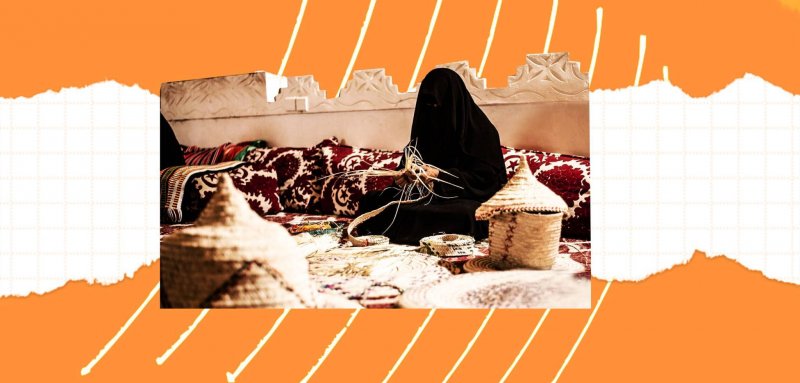Satirah Mufarreh Al-Harisi, 50, learned the craft of leather making from her mother at only 7 years old, before turning it into her profession. Until the age of 14, she used leather scraps to create small items, gradually learning until she was able to produce goods suitable for sale. With her mother, she visited the market, tanneries and leather traders. Eventually, she discovered her ability to craft women's leather accessories and belts.
With time, leather goods show signs of wear and even damage, but Satirah recycles pieces worn by the sun into new pieces. Speaking tells Raseef22, “I take the part that changed color due to heat and recycle it. I can use it to make wicker products – I don't throw them away.”
Rising temperatures, affecting many Saudi regions, including Jizan in Al Dayer where Satirah lives, can cause leather to harden and lose flexibility, making it challenging to manufacture. Additionally, bacterial infections in the material, considered the greatest threat to leather, lead to damage. Satirah softens the leather by soaking it in warm water, which is not always easy. She explains, “If you put the leather in cold water to soften it and make it pliable, it doesn't always respond, becoming difficult to use, as it cannot absorb cold water and no longer be flattened as required.”
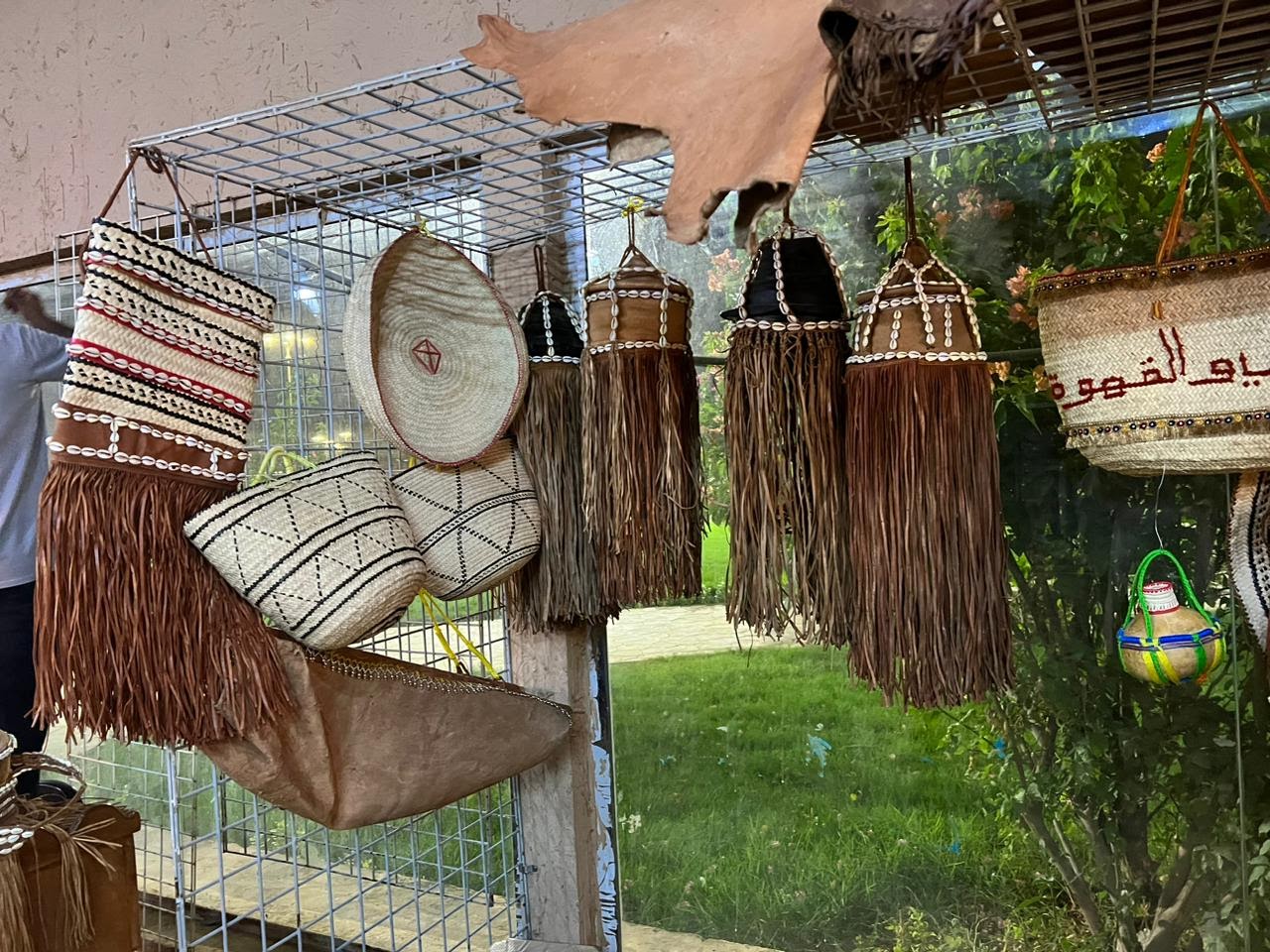 Traditional handicrafts made by Saudi women
Traditional handicrafts made by Saudi women
According to a 2019 study by the King Abdullah Petroleum Studies and Research Center (KAPSARC), temperatures in 11 Saudi cities have noticeably risen over a 10 year period, increasing on average by approximately 0.4 degrees Celsius, to 26.9 degrees Celsius in 2018 compared to 26.5 degrees Celsius previously. The study also noted an increase in average temperatures during the summer months by 0.16 degrees Celsius, reaching 33.4 degrees Celsius in 2018.
According to this study, winters averaged at a temperature of about 19.3 degrees Celsius, an increase of 0.41 degrees Celsius. In 2018, temperatures reached 30 to 40 degrees Celsius for extended periods, unheard of 10 years prior.
In general, the Kingdom experiences a semi-arid climate with a noticeable decrease in annual rainfall. The maximum temperature throughout Saudi Arabia ranges from 20 to 30 degrees Celsius in winter, 30 to 40 degrees Celsius in spring, and up to 45 degrees Celsius in summer.
Saudi women have long since adapted to desert conditions by skillfully using animal wool as raw materials to create textiles. This traditional craft of weaving, the art of Al-Sadu, became an artistic product purchased by the wealthy of the Arabian Peninsula
The traditional craft of Al-Sadu faces extinction
Saudi women have long since adapted to the desert conditions by skillfully using camel wool, sheep's wool, and goat hair as raw materials to create textiles, such as carpets used for placing on the ground, or covering furniture and tents. This traditional craft of weaving, the art of Al-Sadu, became an artistic and economic product patronized by the wealthy of the Arabian Peninsula who used it as saddles for horses and covers for camels. Rafaah Al-Subaie, 50, an Al-Sadu weaver, tells Raseef22, “I feel like I am on a special mission as I carry on the heritage of my grandmother, my mother, and our ancestral women.”
Al-Subaie, hailing from Najd, has dedicated her life to preserving and continuing Al-Sadu, the traditional craft she inherited from her mother. She weaves the sheep’s wool and goat hair to produce clothing, market bags and head covers. However, she has been forced to stop, after rising temperatures have damaged her goods; initially affecting their color before causing the pieces to deteriorate entirely. Faced with a decline in sales, she lament, “After finishing the piece, I leave it waiting for customers in the store. But with the hot weather, the color of the piece begins to change, and it ends up tearing with the slightest touch. Pieces that wear out and corrode end up being thrown out.”
In December 2020, UNESCO, in partnership with the State of Kuwait, recognized the craft of Al-Sadu as part of the Representative List of the Intangible Cultural Heritage of Humanity, becoming the eighth Saudi practice registered with the preservation organization. These efforts, sponsored by the Ministry of Culture, aim to preserve the continuity of this craft.
The center has taken several measures in the face of climate change that include providing training and environmental education, offering workshops for craftswomen on how to deal with climate change and its impact on their products
Climate-defying women's products
Saudi Arabia’s Al-Jawf region is renowned for its olive oil, hosting the International Olive Festival and the Al-Jawf Khairat Harvest Festival. Hiyam Al-Anzi, a cosmetics producer and owner of the brand Lolita, is keen to stamp her products with ‘Made with Al-Jawf Olive Oil’, in a tribute to her hometown.
High temperatures in Saudi Arabia increase the chance of product spoilage. Heat damages the soap surface and hinders necessary chemical reactions needed to produce cosmetic products. The forty-something woman tells Raseef22, “The high temperature during manufacturing causes glycerin to appear, which attracts moisture from the air to the soap. This appears as sweat or droplets on its surface, or it ruins the entire formula, leading us to lose the entire item.” Al-Anzi places her soaps in the refrigerator after pouring, in order to prevent cracking, becoming sponge-like, or causing it to overflow and spill out of the mold.
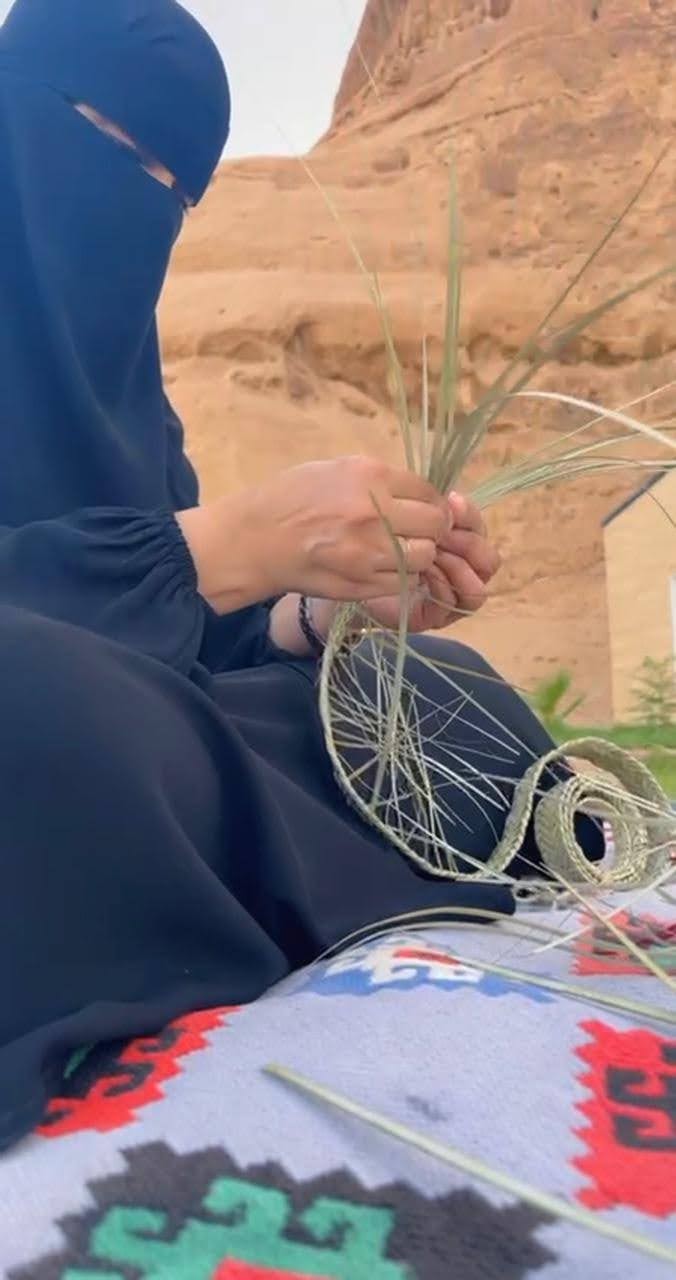 Traditional handicrafts made by Saudi women
Traditional handicrafts made by Saudi women
On the other hand, she believes that the temperature rise and the lack of proper pre-processing for the manufacturing of cleansers in their various types lead to the separation of the components after production, resulting in product damage. Also, it leads to the emergence of an unpleasant odor from the manufactured substance, an indication it has deteriorated due to heat. She adds, “Visible oil stains appear on the piece of soap due to the heat, distorting its appearance and making it unsuitable for sale. On the other hand, the mixture, once it's ready to be poured, does not solidify, so the soap remains liquid, indicating that the mixture has failed. Therefore, I make sure to store my products in cool temperature warehouses to prevent damage.”
The high temperatures in Saudi Arabia increase the chance of product spoilage. In the case of soap production, heat damages the soap’s surface and hinders the necessary chemical reactions required for cosmetic products to be made
Cold damages pottery production
In order to shape pottery, a temperature of about 600 degrees Celsius is required. Nour Al-Mutawia, a craftswoman and potter, tells Raseef22 that cold weather poses a significant obstacle to the success of her experiments in pottery. Prior to the cold and rainy spells Saudi Arabia has been experiencing lately, Al-Mutawia never had such problems with her production.
According to her, cold weather hinders pottery production, making clay difficult to control and causing items to crack in the kiln or during drying due to poor air extraction from the clay. Additionally, even more time is required to model pottery in its initial manufacturing stages. Pieces now take much longer than they used to in previous years. To overcome these obstacles, Al-Mutawia now dries her pottery with a heater, to ensure that any air has been completely extracted. She shares, “I conducted my experiments in Al-Ahsa where the winter temperature drops to 10 degrees Celsius, while the clay requires a high temperature to dry from all the water. The cold is damaging my products.”
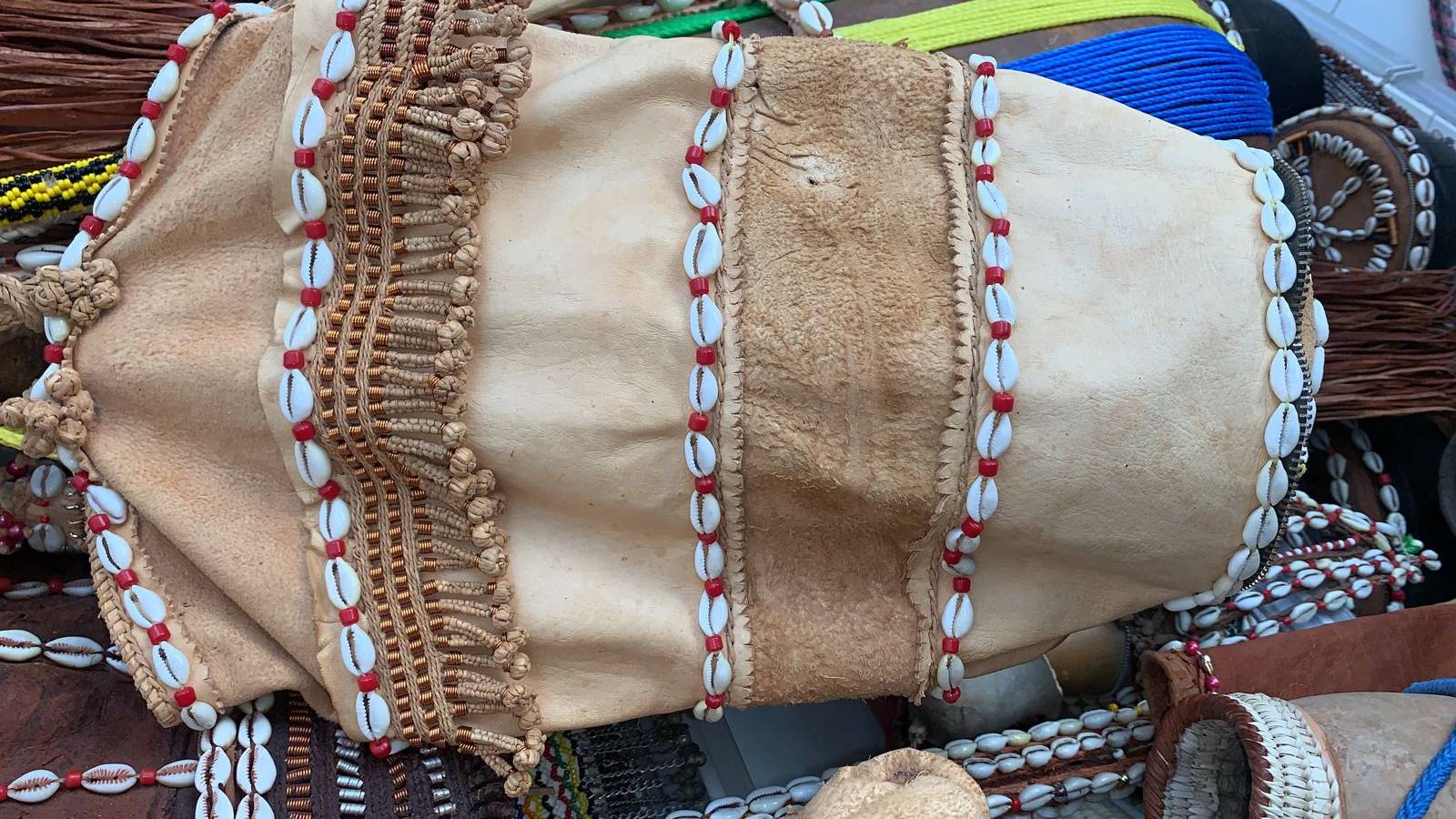 Traditional handicrafts made by Saudi women
Traditional handicrafts made by Saudi women
Saudi heritage villages focus on women's craftsmanship and the production of handicrafts. Hamad Ali Mohsin al-Daqdaqi, general supervisor at Jazan Heritage Village, tells Raseef22 that women's folk handicrafts are a main attraction of heritage villages. The products of the craftswomen participating in the village are diverse, including the manufacture of wickerwork, popular accessories, local fragrance products, clothing, bedspreads, wooden utensils, and decorative items. He emphasizes that the village is making significant efforts to preserve the displayed pieces from damage due to climatic factors and provides advice to craftswomen to mitigate the harmful environmental effects.
Cold weather makes it difficult to control the clay, causing products to crack in the kiln or during drying. Pottery now takes much longer than it used to.
Awareness workshops on climate change
Abdullah Saleh Al-Hudayf, director and founder of the Arbab Al Heraf Center, tells Raseef22 that since the center launched in 2016, it has provided training courses and workshops for women. The goal is to teach women various handicraft skills, in addition to providing the necessary materials and tools required for training. The center also offers advice and guidance from experts in various types of sustainable handicrafts, including embroidery, sewing, weaving, jewelry making, and furniture.
Al-Hudayf points out that Arbab Al Heraf has taken several measures to combat the effects of climate change, including training and environmental education, workshops on how to deal with climate change and its impact on products involving the use of environmentally friendly materials and sustainable production techniques.
He adds, “We work to support craftswomen to develop new products that respond to the needs of a sustainable and environmentally friendly market, such as using recyclable materials or adding elements that improve resource efficiency.”
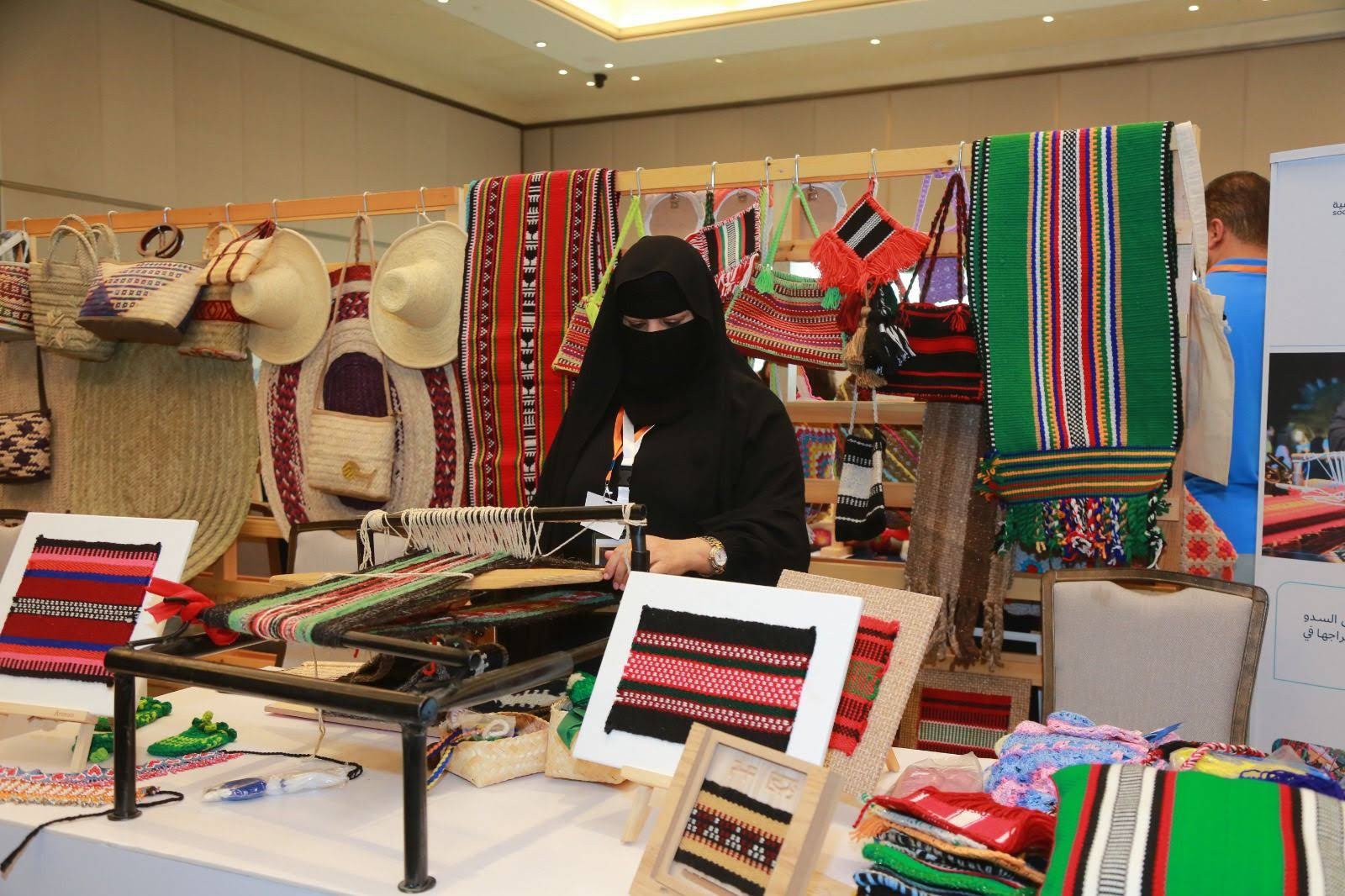 Traditional handicrafts made by Saudi women
Traditional handicrafts made by Saudi women
Raseef22 is a not for profit entity. Our focus is on quality journalism. Every contribution to the NasRaseef membership goes directly towards journalism production. We stand independent, not accepting corporate sponsorships, sponsored content or political funding.
Support our mission to keep Raseef22 available to all readers by clicking here!
Interested in writing with us? Check our pitch process here!
